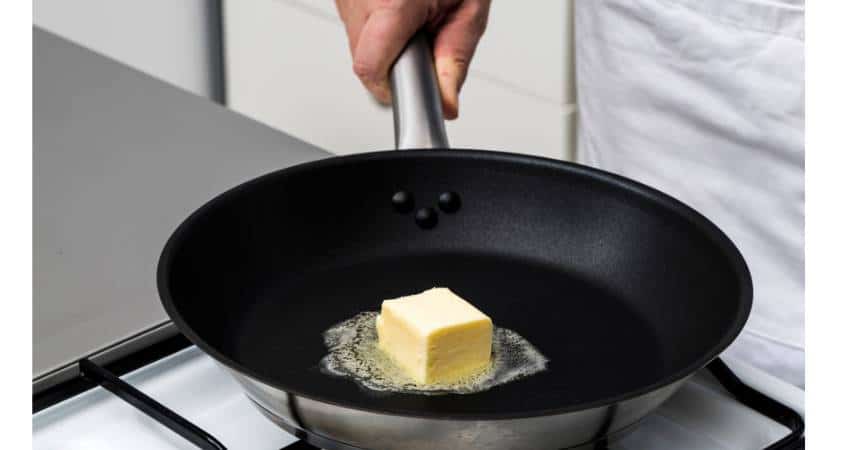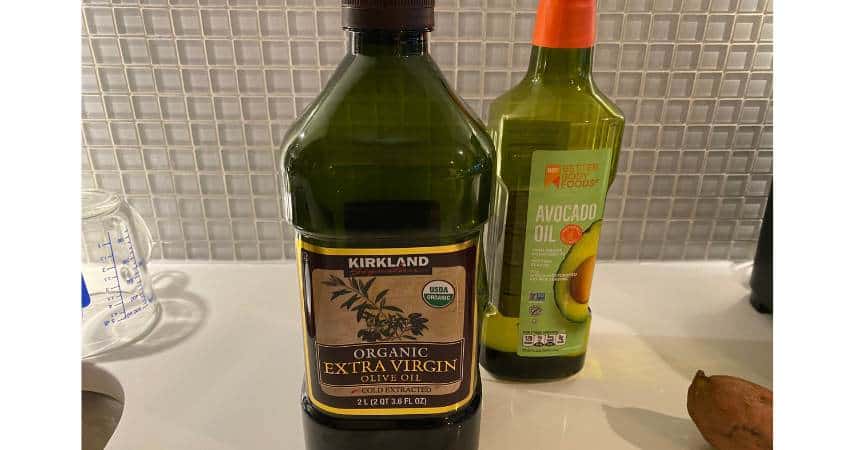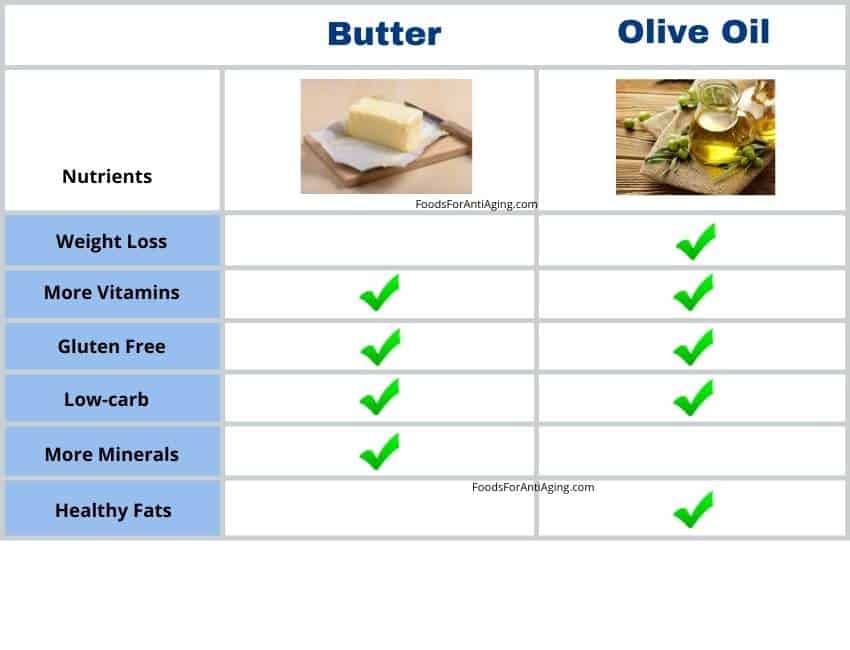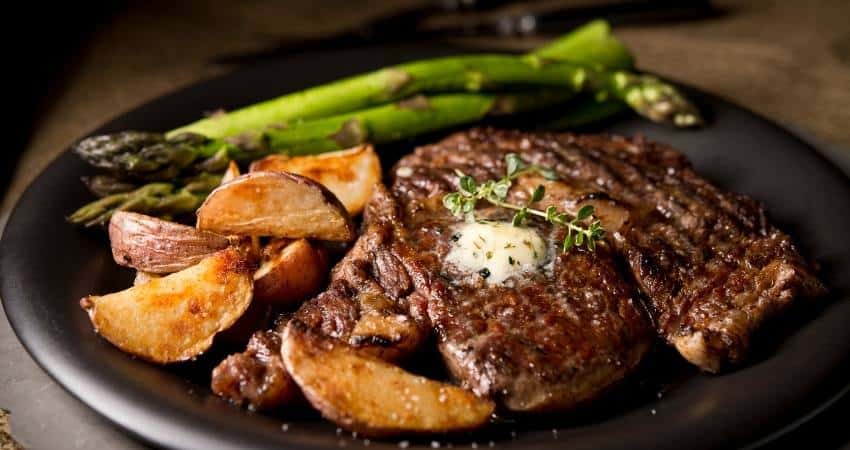Butter vs Olive Oil: Which is Better? A Complete Comparison
For a long time people have been debating over the use of butter or olive oil. It’s a topic which many of my clients bring up during my health coaching sessions. The most common thing people want to know is, what is better butter or olive oil?
Olive oil is better than butter due to its higher percentage of healthy fats and lower percentage of unhealthy fats. It contains 213% more healthy monounsaturated fats than butter. Butter contains 266% more unhealthier saturated fats per tablespoon than olive oil. Olive oil has a higher smoke point and costs less per tablespoon.
This article will include a side-by-side nutrient comparison of the two. I’ll examine if there are times butter should be used instead of olive oil and when they should substitute for each other. In addition, I’ll take a close look at their tastes, prices and health benefits.
I’ve purchased, researched and consumed both prior to, during and sometimes after writing this article.
Butter vs Olive Oil: The Differences
Olive oil is made by extracting the oil from olives using heat and/or chemicals. Butter is made by separating the fat from cow’s milk. At room temperatures, butter is a solid and olive oil is a liquid. Butter tastes creamier and has a shorter shelf life. Olive oil has a higher smoke point than butter.
Let’s Examine Butter
- Made from the milk of cows.
- Has a creamy, rich flavor.
- Cost a little more money per tablespoon.
- Has a lower smoke point.
- Typically the color is white to a light yellow.

Butter is made by the following process:
- Whole milk from cows is added to a machine called a separator.
- The separator spins dividing the fat from the milk and the liquid.
- The fat is added to a tank where the pasteurization process takes place.
- During pasteurization the fat is treated with heat to kill bacteria.
- From the pasteurization tank the fat is moved to a churner where the fat is spun.
- Once the fat is churned, the finished butter is packaged and shipped for sale.
Olive Oil
- Made from olives using heat and chemicals.
- Has a mild, peppery flavor.
- Cost less money.
- Has a higher smoke point.

It is made by the following method:
- Made by using the leftover paste from making extra virgin olive oil.
- The leftover paste is heated and kneaded with chemicals to release more oil, water and residue from the paste.
- The oil is separated from the water and residue.
- The oil is filtered and bottled as olive oil.
- The Italian varieties are the most popular.
All olive oils are held to certain USDA grade standards. Extra virgin olive oil (EVOO) is certified as having the highest grade standards for excellent flavor, odor and free fatty acid content. The extra virgin oil must not exceed 0.8 grams of oleic acid per 100 grams.
Nutrient Comparison
The following table compares the nutrients contained in one tablespoon:
| Olive Oil (1 Tbsp/13.5 grams) | Butter (unsalted) (1 Tbsp/13.5 grams) | |
| Calories | 119 | 97 |
| Protein | 0 g | 0.1 g |
| Carbohydrates | 0 g | 0 g |
| Fiber | 0 g | 0 g |
| Total Fat | 13.5 g | 10.9 g |
| Sugar | 0 g | 0 g |
| Sodium | 0.27 mg | 1.48 g |
| Vitamin K | 8.13 mcg | 0.94 mcg |
| Vitamin E | 1.94 mg | 0.31 mg |
| Vitamin A | 0 IU | 2,500 IU |
| Potassium | 0.135 mg | 3.24 mg |
| Phosphorus | 0.135 mg | 3.24 mg |
| Iron | 0.076 mg | 0.002 mg |
| Calcium | 0.135 mg | 3.24 mg |
| Omega-3 | 103 mg | 42 g |
| Omega-6 | 1,318 mg | 368 g |
| Saturated Fat | 1.86 g | 6.81 g |
| Monounsaturated Fat | 9.86 g | 3.15 g |
| Polyunsaturated Fat | 1.42 g | 0.40 g |
While examining the table above it’s difficult to determine which contains more nutrients. This leads many to a question often asked, which is healthier?
Olive oil is a healthier choice than butter due to its higher percentage of heart healthy fats. It contains 213% more monounsaturated fats than butter which has been shown to help reduce the risk of heart disease. It contains fewer saturated fats which are the least desirable fat for bad cholesterol. It also provides more vitamin K, vitamin E and iron than butter.
Butter does contain a good number of nutrients. It provides more vitamin A and trace amounts of potassium, phosphorus and calcium.
Olive oil and butter are both in the fats group. Although, it’s the major difference between the two.
Butter is much higher in saturated fats than olive oil. This has been shown to increase the risk of bad cholesterol and heart disease. High-quality olive oil is healthy and provides a much higher percentage of monounsaturated fats which has been shown to decrease the risk of heart disease and increase good cholesterol.
The Tribune News and Nutrition Expert Tips
Most registered dietitians and nutritionists recommend to use butter for cooking when it makes sense.
The same has been reported by nutrition experts in the Philly and Tribune News. In situations when either one can be used, it’s healthier to use olive oils.
I try to use EEVO at home as much as possible. I use it for low temperature cooking, salads and dipping.
Let’s examine each nutrient a little closer and determine which one has more of a percentage than the other.
Calories
- Olive oils contain 22.6% more calories per one tablespoon.
Vitamin K
- Olive oil contains 765% more vitamin K per one tablespoon.
Vitamin E
- Olive oils contain 526% more vitamin E per one tablespoon.
Vitamin A
- Butter contains more vitamin A per one tablespoon.
Potassium
- Butter contains 2,300% more potassium per one tablespoon.
Phosphorus
- Butter contains 2,300% more phosphorus per one tablespoon.
Iron
- Olive oil contains 3,700% more iron per one tablespoon.
Calcium
- Butter contains 2,300% more calcium per one tablespoon.
Saturated Fat
- Butter contains 266% more saturated fat per one tablespoon.
Monounsaturated Fat
- Olive oil contains 213% more monounsaturated fat per one tablespoon.
Polyunsaturated Fat
Olive oil contains 255% more polyunsaturated fat per one tablespoon.

Which to Choose Based on Your Goals
Choosing which food may depend on your particular goal. Therefore, in this section I examine the most common goals people have. I’ll determine which one is the better choice for each one.
Weight Loss
If you’re looking to lose some weight, the number of calories may matter to you. Sometimes the calorie count alone isn’t enough to make a determination about weight loss. This may be one of those times.
Therefore, let’s examine which is better for weight loss.
- Even though butter has fewer calories per tablespoon, the difference doesn’t vary significantly. Olive oil is better for weight loss due to its overall healthy fat content. A diet based on healthy fats, like the Mediterranean diet, is associated with weight loss.
- The monounsaturated fats has been shown to increase good cholesterol and both have been associated with weight loss in studies3.
- It contains a good amount of medium-chain triglycerides which has been associated with weight loss and maintenance in studies4.
- Studies have shown when people replaced saturated fat with monounsaturated fats they lost weight, despite no change in calories5.
Even though it is considered a healthy addition to your diet, at 119 calories per tablespoon the calories can add up pretty fast.
It’s easy to add multiple tablespoons into a salad. Four tablespoons equal 476 calories added to the salad. Always be aware of the number of tablespoons added and try not to overdo it.
The following video compares EVOO and butter.
Low Carb or Keto Diets
The goal of most low-carb diets is to consume few carbohydrates while adding more protein and healthy fat. Every carbohydrate can make a difference depending on the diet followed.
Therefore, let’s examine which one has fewer carbohydrates or more healthy fat.
- Olive oil is better for low carb diets than butter due to its higher percentage of healthy fats. It provides 13.5 grams of total fat per tablespoon while butter has 10.9 grams of total fat. Both have an equal number of carbohydrates per tablespoon which is zero grams.
- A higher percentage of the fat is the healthier monounsaturated fats. A higher percentage of the fat contained in butter is the less healthier saturated fat.
Bodybuilding
If you’re trying to gain lean muscle mass, the amount of protein and carbohydrates may make a difference. Let’s take a look at each one and determine which is better for bodybuilding.
Although they both contain the same number of proteins and carbohydrates, olive oil is better for bodybuilding. This is due to its higher percentage of healthy fats, antioxidants and calories.
- It contains oleic acid which has been shown to stimulate protein production and synthesis6.
- The antioxidants help fight free radicals and prevent cell damage. It’s difficult to build and repair muscle cells with free radicals.
- It is associated with decreases in inflammation which can benefit the joints.
- One of its antioxidants, oleocanthal, is an anti-inflammatory that also reduces pain in joints.
- When bulking up, the calories may prove beneficial.

Gluten Free
Avoiding any gluten is the main goal for people who wish to follow a gluten free diet or have Celiac disease. Therefore, let’s examine which one is gluten free.
- Butter and olive oil are both gluten free and good for gluten free diets.
Vegan or Vegetarian
If you’re thinking about following a vegan or vegetarian diet consuming dairy products or animal-derived products is important. Knowing which one is vegan or vegetarian friendly may help you choose between the two.
Olive oil is better for vegans than butter made from cream or milk that comes from cows. Some vegetarians may consume butter depending on the type of vegetarian they fall into.
Olive oil is plant based and does not contain animal products making it better for vegans and vegetarians.
Lactose Intolerance
People with lactose intolerance are unable to fully digest the lactose in milk. Lactose intolerance is also called milk intolerance. So knowing which one is better for lactose intolerance is important.
Butter contains low levels of lactose which makes lactose free olive oil better for lactose intolerance. Although the very low lactose levels typically doesn’t affect people with lactose intolerance, it does contain a small amount.
Butter is made by churning cream or milk to separate its solid fat and liquid components. The liquid part of the milk, which contains the lactose, is removed during the processing but small amounts of lactose remain in the finished product.
Taste
Sometimes the nutrients and goals don’t matter much, and the taste is more important. After all, if someone doesn’t like how something tastes, they will probably leave it on the shelf.
Therefore, let’s examine how the taste of both compare.
Olive oil has a slightly strong flavor with a hint of olives and is peppery. Butter is rich and creamy and can taste slight nutty when browned. The extra virgin variety will have more flavor than the refined versions.
I wanted to get the opinion of real people like you by conducting some original research. Therefore, I reached out to some members of food groups, clients and readers. I asked, what tastes better?
- 49% said they preferred the taste of butter.
- 39% said they preferred the taste of olive oil.
- 12% said it depended on the dish or the had no preference.
In the battle of taste, butter tastes better and was the winner in the poll.
The doctor in the following video compares the use of olive oil vs butter.
Substitutions
Have you ever wanted to try a new recipe the last minute and found out you didn’t have the food ingredient at home? Unable to go out to the store or just don’t want to, you’ve probably wondered if you can use one or the other in its place.
Reasons why people will want to substitute one food for the other in a recipe:
- Availability
- Taste
- Variety
- Smoke point
- Price
This makes people wonder if they can substitute one for each other.
Butter and olive oil can substitute for each other when cooking in temperatures 302°F or less. When cooking in higher temperatures, butter cannot substitute for olive oil due to its lower smoke point. When cooking above 302°F olive oil can substitute for butter up to 470°F when using refined.
They can substitute for each other in cold dishes when the finished flavor is desirable. In addition, they can substitute for each other in some hot dishes after its cooked liked cooked pasta, cooked seafood, room temperature bread or baked bread.
Smoke Points
The following are the smoke points for both:
| Type of Oil & Fats | Smoke Point (Fahrenheit) |
| Butter | 302°F |
| Clarified or Ghee Butter | 482°F |
| Olive Oil – Refined | 470°F |
| Olive Oil – Virgin | 410°F |
| Olive Oil – Extra virgin | 375°F |
Smoke point source ((Wikipedia: Smoke point))
The Prices
With inflation lately, the price of groceries keeps rising. It seems I spend more and more every month at the supermarket. For this reason and others, I’m sure the prices of food matters to most people.
I checked the price of all store brands to keep things on an even playing field. I divided the price by one tablespoon serving. Therefore, let’s examine the prices of each one.
Butter costs 8.4% more than olive oil per tablespoon. Olive oil average cost per tablespoon is $0.12 and the average price for butter is $0.13 per tablespoon.
To conduct my own research, I checked three different supermarkets located in my area. All the supermarkets are on different levels of pricing. Walmart is the most economical and Stop and Shop being more expensive.
Here are my findings, I first visited Walmart:
Walmart:
- Stick butter (Store brand) – 16 ounce $4.48 ($0.14 per tablespoon)
- Olive oil (Store brand) – 17 ounce $2.88 ($0.08 per tablespoon)
Stop and Shop:
- Stick butter (Store brand) – 16 ounce $4.49 ($0.14 per tablespoon)
- Olive oil (Store brand) – 25.3 ounce $6.79 ($0.14 per tablespoon)
Shoprite
- Stick butter (Store brand) – 16 ounce $3.99 ($0.12 per tablespoon)
- Olive oil (Store brand) – 25.5 ounce $6.49 ($0.13 per tablespoon)
Find out how vegetable oil compared in my article.

Storage
Good quality food can be costly, therefore, the shelf life you get out of it is important. In addition, improper storage may lessen the taste and quality. Let’s examine how each one should be stored.
Store unopened olive oil in a cool, dark location away from light. It’s best to store it in a tinted glass container. It should be kept at a temperature between 55-60℉, although it can be refrigerated or frozen if needed.
Unopened it should be stored in the refrigerator if the room temperature rises above 70℉. Leaving it in warmer temperatures affects shelf life and lessens the quality.
Due to heat-creating appliances and heated ovens, kitchens tend to be a bit warmer than most other rooms of the house. Therefore, be sure to monitor the temperature of the room.
For the best storage, butter has to be stored in the refrigerator. This is especially true if it is unsalted. Refrigeration slows down the oxidation process which eventually makes it go rancid.
It is unrecommended to keep butter out of refrigeration for more than a couple of days. In addition, if the room temperature is warmer than 70℉, it should be refrigerated.
It can be frozen for longer term storage up to one year.
I store mine in the kitchen cabinet but its in a cool area and away from heat.
Grapeseed oil is another one compared in my article here.
Health Benefits
Olive Oil Benefits
The doctor in the following video explains the benefits of using olive oil.
Cancer
The cancer rates in Mediterranean countries is lower than other places. Extra virgin olive oil consumption is a huge part of the diet in those countries.
Antioxidants are believed to contribute to the killing of cancer cells. In a 2015 study, oleocanthal, a phenolic compound present, helped kill cancer cells in less than one hour7.
Another study published in 2015 evaluated the consumption of the Mediterranean diet and the incidence of breast cancer. For a six-year period, 4,282 women aged 60 to 80 years followed three different diets:
- Mediterranean diet supplemented with extra virgin olive oil.
- Mediterranean diet supplemented with mixed nuts.
- A reduced fat diet.
After 4.8 years 35 of the women developed breast cancer. The lowest rate of breast cancer was seen in the women who supplemented with the EVOO8.
Oleic acid has been associated with helping to reduce the risk of cancers.
Heart Disease
Heart disease and stroke are among the most common causes of death throughout the world. Studies have shown heart disease is lower in the Mediterranean countries.
There are many ways it is beneficial for the heart including the following:
Blood Vessel Health
It has been shown to help improve the lining of blood vessels. A study published in 2015 showed blood vessels opened up and increased blood flow in people who included olive oil in their diet9.
Reducing Inflammation
It is associated with decreases in inflammation which is a main component of heart disease. An antioxidant, oleocanthal, is an anti-inflammatory that also reduces pain10.
Lowering Blood Pressure
Studies have shown an association between lower blood pressure and an increase in olive oil consumption. The Mediterranean diet has been linked to lower blood pressure and cardiovascular disease11.
Brain Health
Several studies conducted on humans have shown the Mediterranean diet may be associated with a reduced risk of cognitive problems and dementia12.
Alzheimer’s disease is the most common form of dementia causing problems with thinking, memory and behavior. A common feature of the disease is the build-up of proteins known as beta-amyloid plaques in certain neurons in the brain.
Animal studies have shown extra virgin olive oil to clear the beta-amyloid proteins from the brain helping to prevent Alzheimer’s disease13.
Find out how sesame oil compared in my comparison article.
The following video explains a new study on the benefits of olive oil.
Butter Benefits
Digestion
Butyrate is a fatty acid found in butter which has been associated with many digestion benefits.
Butyrate can help improve digestive health by decreasing inflammation in the intestines and support the intake of fluids and electrolytes to promote regularity and electrolyte balance14.
Butyrate is produced by the good bacteria in the gut and is used as a source of energy for the cells in the intestines.
Some research suggests butyrate may help treating Crohn’s disease because of its anti-inflammatory properties15.
Finally, butyrate may help in treating irritable bowel syndrome16.
Conjugated Linoleic Acid (CLA)
CLA is a fat found in dairy and meat products. It has been associated with the following health benefits.
Some studies have shown CLA may help reduce the risk and growth of breast, stomach, prostate, colon and liver cancer17.
CLA has also shown it may help immune function and decrease the markers of inflammation. In one study, 23 men decreased levels of proteins involved in inflammation after taking CLA for two weeks18.
Find out how avocado oil compared in my article here.

If you have any questions about this article don’t hesitate to email us. You can find an email on our contact page.
Read More FoodArticles
Olive Oil vs Coconut Oil: Which is Better? Let’s Compare
Olive Oil vs Soybean Oil: Which is Better? Let’s Compare
Sunflower Oil vs Olive Oil: Which is Better? Let’s Compare
Extra Virgin Olive Oil vs Olive Oil: A Complete Comparison
Olive Oil vs Canola Oil: Which is Better? Let’s Compare
The Complete Guide To Storing Extra Virgin Olive Oil
Can Extra Virgin Olive Oil Go Bad? What You Need To Know
Can I Replace Olive Oil With Coconut Oil?
This is the Best Way to Store Your Olive Oil
- USDA: Oil, olive, salad or cooking [↩]
- USDA: Butter, without salt [↩]
- National Center for Biotechnology Information: High Fat Diet with a High Monounsaturated Fatty Acid and Polyunsaturated/Saturated Fatty Acid Ratio Suppresses Body Fat Accumulation and Weight Gain in Obese Hamsters [↩]
- National Center for Biotechnology Information: Effects of medium-chain triglycerides on weight loss and body composition: a meta-analysis of randomized controlled trials [↩]
- National Center for Biotechnology Information: Substitution of saturated fat with monounsaturated fat in a 4-week diet affects body weight and composition of overweight and obese men [↩]
- National Center for Biotechnology Information: An overview of the modulatory effects of oleic acid in health and disease [↩]
- Taylor & Francis Online: (-)-Oleocanthal rapidly and selectively induces cancer cell death via lysosomal membrane permeabilization [↩]
- Jama Internal Medicine: Mediterranean Diet and Invasive Breast Cancer Risk Among Women at High Cardiovascular Risk in the PREDIMED Trial [↩]
- (National Center for Biotechnology Information: Effects of Olive Oil on Markers of Inflammation and Endothelial Function-A Systematic Review and Meta-Analysis [↩]
- National center for Biotechnology Information: Olive Oil-related Anti-inflammatory Effects on Atherosclerosis: Potential Clinical Implications [↩]
- National Center for Biotechnology Information: Virgin Olive Oil and Hypertension [↩]
- National Center for Biotechnology Information: Mediterranean Diet and Risk of Dementia and Alzheimer’s Disease in the EPIC-Spain Dementia Cohort Study [↩]
- National Center for Biotechnology Information: Extra-Virgin Olive Oil Attenuates Amyloid-β and Tau Pathologies in the Brains of TgSwDI Mice [↩]
- National Center for Biotechnology Information: Potential beneficial effects of butyrate in intestinal and extraintenstinal diseases [↩]
- National Center for Biotechnology Information: Oral butyrate for mildly to moderately active Crohn’s disease [↩]
- National Center for Biotechnology Information: Butyric acid in irritable bowel syndrome [↩]
- National Center for Biotechnology Information: Role of the conjugated linoleic acid in the prevention of cancer [↩]
- National Center for Biotechnology Information: Anti-inflammatory effects of conjugated linoleic acid on young athletic males [↩]
